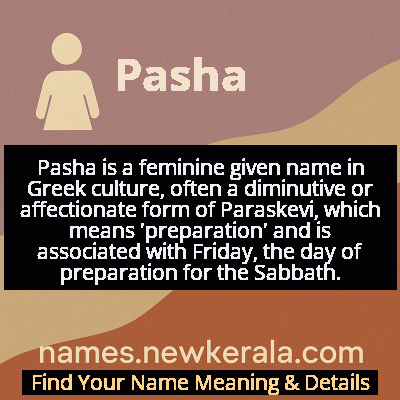Pasha Name Meaning & Details
Origin, Popularity, Numerology Analysis & Name Meaning of Pasha
Discover the origin, meaning, and cultural significance of the name PASHA. Delve into its historical roots and explore the lasting impact it has had on communities and traditions.
Name
Pasha
Gender
Female
Origin
Greek
Lucky Number
9
Meaning of the Name - Pasha
Pasha is a feminine given name in Greek culture, often a diminutive or affectionate form of Paraskevi, which means 'preparation' and is associated with Friday, the day of preparation for the Sabbath.
Pasha - Complete Numerology Analysis
Your Numerology Number
Based on Pythagorean Numerology System
Ruling Planet
Mars
Positive Nature
Generous, passionate, energetic, and humanitarian.
Negative Traits
Impulsive, impatient, moody, and can be overly emotional.
Lucky Colours
Red, maroon, scarlet.
Lucky Days
Tuesday.
Lucky Stones
Red coral, garnet.
Harmony Numbers
1, 2, 3, 6.
Best Suited Professions
Military, sports, philanthropy, leadership roles.
What People Like About You
Courage, energy, leadership, generosity.
Famous People Named Pasha
Pasha Kovalev
Professional Dancer and Choreographer
Strictly Come Dancing professional and World Latin Championship finalist
Pasha Parfeni
Singer and Songwriter
Represented Moldova in Eurovision Song Contest 2023
Pasha D. Lychnikoff
Actor
Appeared in numerous Hollywood films including 'Mission: Impossible III' and 'The Last Stand'
Name Variations & International Equivalents
Click on blue names to explore their detailed meanings. Gray names with will be available soon.
Cultural & Historical Significance
Extended Personality Analysis
Women named Pasha typically exhibit a unique blend of traditional values and contemporary adaptability. Their connection to the Easter meaning often manifests as an innate resilience and capacity for personal transformation—they tend to be individuals who can navigate life's challenges with remarkable grace and emerge stronger from difficulties. Pashas are frequently described as warm, approachable, and emotionally intelligent, possessing an intuitive understanding of others that makes them excellent friends and confidantes. They often demonstrate strong leadership qualities tempered with compassion, making them effective in both professional and personal spheres. Many Pashas show a deep appreciation for beauty, art, and cultural traditions while maintaining a progressive outlook on life. Their spring-associated origins often translate into personalities marked by optimism, creativity, and the ability to inspire renewal in those around them. This combination of spiritual depth and practical wisdom makes Pashas particularly effective in roles that require both empathy and decisive action.
Modern Usage & Popularity
In contemporary naming practices, Pasha has evolved into a sophisticated choice that balances cultural heritage with modern appeal. While maintaining its strong Greek Orthodox roots, the name has gained traction in multicultural urban centers where parents seek distinctive names with meaningful backgrounds. Recent decades have seen Pasha adopted by families outside Greek communities, attracted by its melodic sound and the positive symbolism of rebirth and new beginnings. The name's usage patterns show interesting geographical variations—it remains most popular in areas with significant Greek populations like Australia, the United States, and Canada, while also appearing in Western Europe as part of the trend toward internationally recognizable names. Social media and celebrity culture have contributed to its increased visibility, though it maintains its status as an uncommon rather than trendy choice. Current data suggests Pasha appeals particularly to educated, cosmopolitan parents who value both cultural specificity and global accessibility in their children's names.
Symbolic & Spiritual Meanings
The symbolic resonance of Pasha extends far beyond its literal 'born at Easter' meaning to encompass profound metaphorical significance. As a name connected to Easter, it carries the powerful symbolism of resurrection—representing the eternal cycle of death and rebirth, endings and new beginnings. This makes Pasha emblematic of human resilience and the capacity for transformation that exists within every individual. The name also symbolizes light emerging from darkness, hope triumphing over despair, and the constant possibility of renewal. In a psychological context, Pasha represents the archetype of the phoenix—the ability to rise from adversity stronger and more beautiful than before. The spring association adds layers of meaning related to growth, fertility, and the awakening of new potential. These rich symbolic dimensions make Pasha not just a name but a narrative of human possibility, speaking to our deepest aspirations for redemption, growth, and the perpetual renewal of spirit that defines the human experience at its most meaningful.

